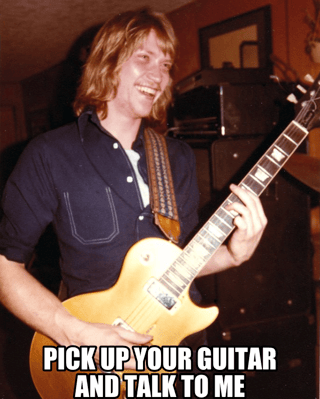
Remember that glorious day when you discovered that a well-placed rest could be just as beautiful as a stream of sixteenth-note triplets? (If you haven’t reached that transcendental moment yet, do it soon! Your audience will appreciate it, and your bandmates will throw a party in your honor.)
The idea for this blog originated from a series of videos my son sent me of several young metal guitarists displaying some amazing speed and dexterity. I saw some incredible shredding, arpeggios, tapping – playing far beyond my abilities. I surprised my son when I told him I had a lot of admiration for their skills, but I had no further desire to listen to them. They weren’t speaking to me. It was as if someone was screaming “Supercalifragilisticexpealidocious,” in my ear over and over. I could appreciate their abilities as musical athletes, but they weren’t communicating with me. I thought I understood why (I blamed lack of phrasing skills), but it wasn’t until I wrote this blog that I came to a real understanding of my reaction.
Looking back, I’ve noticed that my early tastes gravitated toward guitarists whom I felt were masters of phrasing and melody, rather than masters of extreme guitar technique. Leslie West, B.B. King, Joe Walsh – these were the people I wanted to learn from, as much I admired the fire and fury of Hendrix and McLaughlin. (Granted, I couldn’t play their stuff at the time anyway.) Even in a band like The Allman Brothers, to whom I was originally drawn by the solos of Duane, I found myself borrowing from the rhythmic style of Dickie Betts. Duane brought the “rock,” but Dickie brought the “roll.” His solos turned like an elegant wheel of tension and release. I liked that.
Isn’t music a type of communication? Think about how we speak to one another. We construct a sentence from words of varying numbers of syllables. We emphasize certain words and syllables. We change our inflection. We pause at a comma, or the end of a sentence. Every now and then, we need to breathe. Speech is inherently musical. You could easily notate it on a musical staff. Shouldn’t our guitar solos be as musical as our speech? Maybe that’s why we refer to the note/rhythm relationship as “phrasing.” We are creating phrases in a context of musical communication.
When communicating through speech, we first focus on content – what we want to say. To effectively deliver our communication, we’ll include a pattern of emphasis and pauses to ensure our most important ideas are spotlighted. A guitar solo can be constructed in the same way. When we think in this manner, we’re actually constructing more than just a solo, we’re building a composition. Thinking in terms of a composition within a composition is what lifted David Gilmour to guitar hero status.
Listen to Gilmour’s material prior to working with producer Alan Parsons on Dark Side of the Moon. He was definitely a capable blues-rock player. But, during the sessions for DSotM, Parsons demanded that each guitar solo be a clear and concise composition that could be easily sung. Gilmore would arrive at the studio each day and be allowed one take to attempt a solo. Parsons would shake his head and send him home to work up something different. After weeks of attempts, he eventually composed the solos heard on the album, and they are all beautiful, memorable, and quite singable. Gilmour absorbed the point of Parsons’ exercises and became one of our most respected virtuosos.
The late journeyman saxophonist Tim Green offered some great wisdom on the subject of music as communication. We played a gig together in New Orleans and during a break he told me that within a one year period he had been blessed to play with Peter Gabriel, Bruce Hornsby, The Indigo Girls, Kenny Burrell, and Wynton Marsalis. I wanted to know how he approached soloing in so many diverse styles.
Tim said, “I think of playing with new people as joining in a conversation. The song is the topic of conversation. I listen to what others are saying, and when I feel I have something to say, I’ll throw in a sentence, or a paragraph. Then I’ll listen some more. I’m a guest, and it’s not my place to dominate or change the topic of the conversation.”
When I recalled Tim’s words, it finally struck me why my son’s videos didn’t resonate with me – there are simply some topics of musical conversation that appeal to me, and some that don’t. It’s the same with real-life verbal communication.
Every topic, in every musical genre, has specific phrasing conventions that apply to that particular conversation. If you’re telling a story of struggle and heartache, you may choose the language of the blues, or of classic country to tell your tale. Perhaps you choose a rock style to tell a story of sexual escapades. If you’re telling a story of anger, grief, fear and death (topics which are not my personal favorites), metal may be a perfect venue for that, and you would expect that musical conversation to be delivered in the same style as it would be verbalized: Extreme emotion, rapid-fire shouting, and repetition. I understand the communication, even if it doesn’t appeal to me.
We learn our instruments as we learned to speak as toddlers – by imitation. Hopefully, we grow musically as we grew verbally, to develop our own phrases and personal style of communication. Are you still imitating, or are you communicating? Think about what you want to say, how you want to say it, then pick up your guitar and talk to me.
